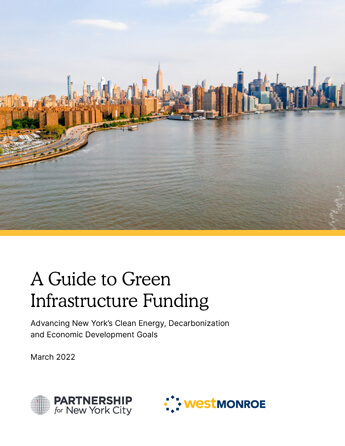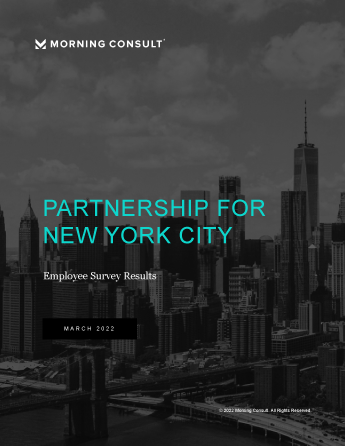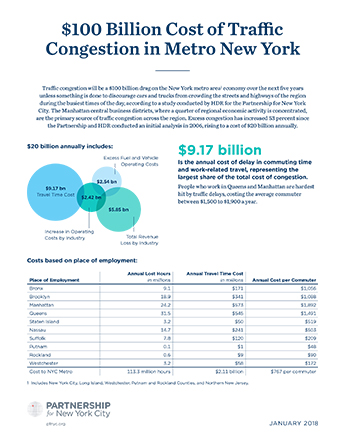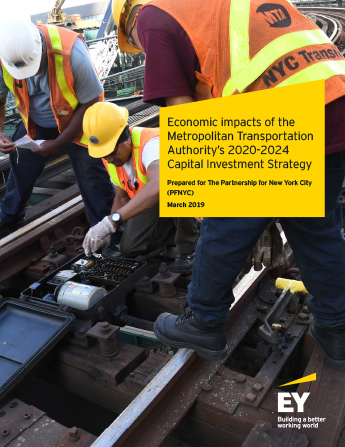CHALLENGES
New York City suffers from aging infrastructure that frequently fails to meet modern performance standards. Upgrading of airports, roads, public transit, water, and sewer systems has lagged growth in population and economic activity across the five boroughs. Investment in improving energy, resiliency, and telecommunications infrastructure has been delayed by bureaucratic and political obstacles. New York also has a severe housing shortage and much of its affordable stock is in very poor condition. For New York to remain a center of global talent and innovation, it will be necessary to mount a major public-private initiative to modernize the city’s built environment.
OPPORTUNITIES
Public-private partnerships (P3’s) offer the most effective approach to modernization and expansion of urban infrastructure. The Partnership was founded on this principle and has been a leading advocate for the P3 approach to meet the city and state infrastructure challenges. Today, Partnership members are working with all levels of government to advance transit improvements, mitigate vehicular congestion, facilitate the transition from fossil fuels to renewable energy sources, increase the housing stock, upgrade telecommunications, and insulate the city against rising sea levels and extreme weather.
$1.5B
Congestion pricing has been approved for the Manhattan central business districts, estimated to raise $1.5 billion for transit and reduce the $20 billion annual cost to the region’s economy due to excess congestion.
$20B
The Port Authority of New York and New Jersey and New York state are leading over $20 billion of investments to rebuild LaGuardia Airport and upgrade John F. Kennedy International Airport.
Our Work in Transit and Infrastructure
ADVOCACY AND PARTNERSHIPS
Congestion Pricing
Following Governor Hochul’s pause on congestion pricing in June 2024, the Partnership continues to advocate for its implementation.
Prior to the pause, the Partnership helped get the nation’s first congestion pricing zone approved by the state Legislature in 2019. Congestion pricing is anticipated to increase peak period traffic speeds in the central business district by at least 15% and generate up to $1.5 billion a year to help fund modernization of the transit system. Legislation authorizing the plan was passed as part of the New York state 2019-2020 budget, reflecting the work of two commissions supported by the expertise of the Partnership and its members. The Federal Highway Administration’s Environmental Assessment was released in Summer 2022 and is undergoing public review.
To secure enactment of the zone, the Partnership ran a public education campaign and commissioned an analysis conducted by EY that demonstrates the economic impact of the MTA Five Year Capital Plan, which is projected to generate more than $60 billion in statewide economic output and over 57,000 jobs.
Learn morePROGRAMS
Transit Tech Lab
The Transit Tech Lab launched in 2018 in partnership with the Metropolitan Transportation Authority (MTA) to apply technology solutions to address urgent transit delivery challenges. In 2019, the program expanded to include NJ Transit, the NYC Department of Transportation, and the Port Authority of NY and NJ.
Learn morePROGRAMS
Buildings Tech Lab
The Buildings Tech Lab launched in 2024 in collaboration with the New York City Department of Buildings to accelerate innovation in construction, safety, and sustainability in New York City’s built environment.
Learn moreADVOCACY AND PARTNERSHIPS
Design-Build
The Partnership joined labor, trade, and business groups in backing expanded design-build authority for New York City, which was authorized by the state in late 2019. Localities can now use this streamlined method of public procurement and contracting to save time and money through a single bid process. With expanded design-build authority, New York can more efficiently invest in its infrastructure and shave hundreds of millions of dollars from the city’s 10-year capital plan and years to project timelines.
ADVOCACY AND PARTNERSHIPS
Gateway Program Development Corporation
The Partnership for New York City advises the Gateway Development Corporation by sharing the impact of the infrastructure projects on New York City’s business community and economy. The Partnership provides testimony at board meetings and public comment at press conferences in support of the Hudson River Tunnel project and Portal North Bridge. These infrastructure projects are vital to New York City as 330,000+ commuters cross the Hudson River each day pre-pandemic on public transit. This heavy traffic means that for every hour of delay on NJ TRANSIT, city employers incur over $7 million in losses.
ADVOCACY AND PARTNERSHIPS
Commercial Waste Reforms
The Partnership was an early supporter of the city’s plan to transition commercial waste collection to a zoned system to address inefficiencies, congestion, safety, and environmental concerns. The Department of Sanitation will create 20 zones throughout the city and select up to three carters to operate in each zone. An additional city-wide zone with up to five carters will be created for large properties where containers are filled at one stop and go directly to a waste transfer station. It will help the city achieve environmental goals, create standards for worker safety, and encourage increased investment in recycling and clean trucks. Zones are anticipated to go into effect in 2023.
Leadership in Action
The Partnership leads and supports many cross-sector industry groups focused on infrastructure investment and reaching the city’s environmental goals to combat the climate crisis.
- Adams Commission: A Blueprint for a Better Buildings Department
- Coalition for the Northeast Corridor
- MTA Blue Ribbon Panel to Combat Fare Evasion
- Port Authority Travel & Tourism Advisory Group
- Traffic Mobility Review Board
- Climate Coalition for Lower Manhattan



